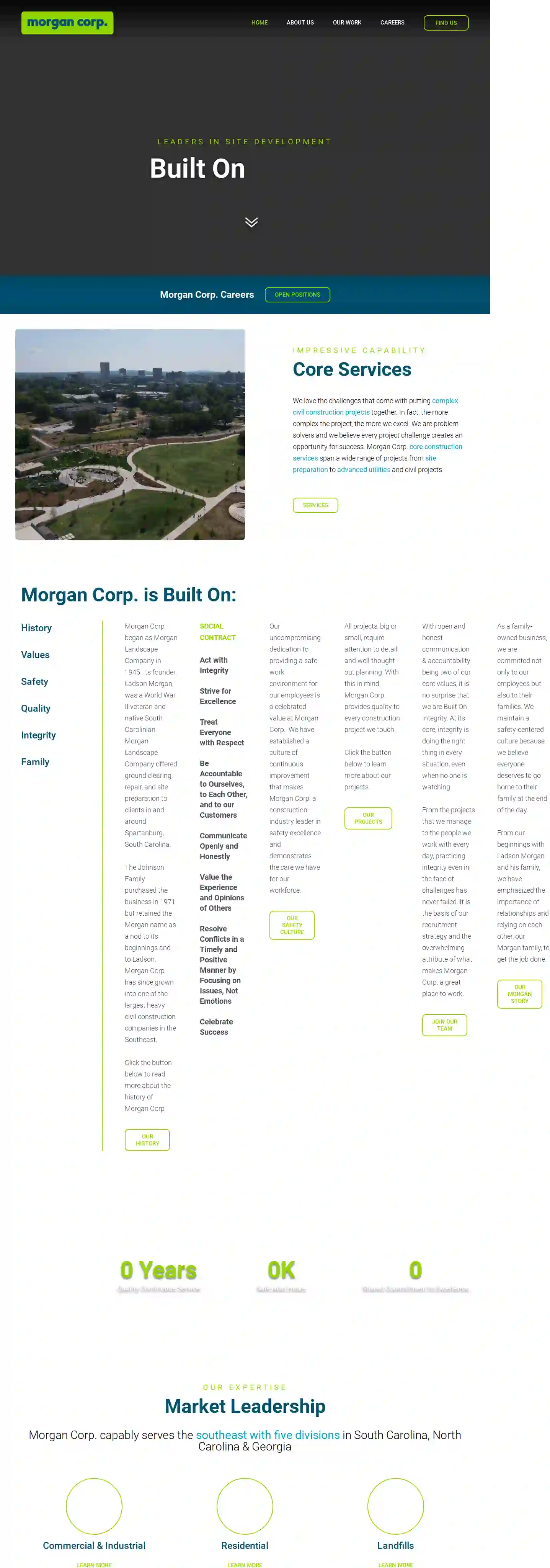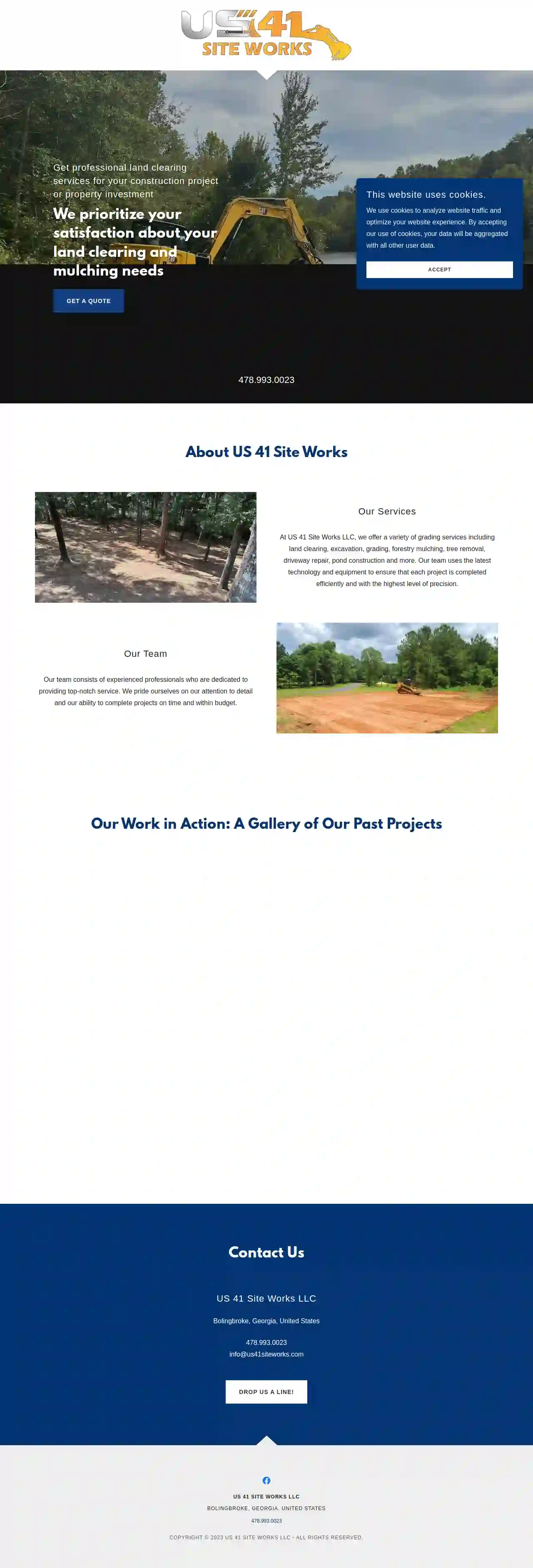Excavation Contractors Sandy Springs
Find Land Excavation in Sandy Springs
Get up to 3 Excavation Contractors quotes for your project today! Compare profiles, reviews, accreditations, portfolio, etc... and choose the best deal.

John Eramo & Sons, Inc.
4.26 reviews3670 Lacon Road, Hilliard, 43026, USYour Central Ohio Site Development Contractor From the initial consultation & estimate, to the final installations, Eramo & Sons handles your project with the utmost care. Comprehensive Excavation & Construction Services to Complete the Job John Eramo & Sons is a 3rd generation, family-owned and operated excavation & site development contractor based in Hilliard, Ohio. With safety, timeliness and complete customer satisfaction at the helm of our operation, we have proudly stood atop the industry in Central Ohio, excelling in earthmoving, underground utility construction, demolition services & a number of other fields. We bring your vision to life, starting from excavation, then off to seamless pavement work & all the way to installation of water lines & asphalt street lights. As a complete site development contractor, we can do it all in one contract. A foundation of Experience & Excellence As a 3rd generation family-owned business, we believe that our employers are an integral part of our organization – our family. Many of our valued employees have more than a decade of construction experience, helping to bring our customers not only quality and experience they deserve but the dependability of longevity that exceeds expectations. Our managment team alone has more than 100+ years of combined field experience. When you’re looking for a site development contractor you can trust, invest your confidence in Eramo & Sons.
- Services
- Why Us?
- Gallery
Get Quote
United Grading & Excavating
319 reviews199-A Fairburn Ind Blvd, Fairburn, 30213, USAbout United Grading & Excavating United Grading & Excavating is a full-service Site Development Contractor, specializing in clearing, grading, and utility work. We have a SAFETY EMR RATE OF 0.71. Our company performs commercial, industrial, multi-family residential, municipal, and governmental site development throughout the Southeast. United Grading and Excavating is committed to providing expert service at a competitive price while completing projects in a timely manner. Our growth is reflected in an ever-expanding list of satisfied customers that appreciate consistency in work, attention to detail, and commitment to a job well done. United Grading & Excavating can perform either as a general contractor working directly for the owner of a project, or as a subcontractor to another general contractor or construction manager. With multiple crews and an extensive fleet of equipment, we can meet the overall schedule of any project. Our management team, with more than 60 years of site work experience, along with our highly motivated and accomplished field personnel, ensures that we will meet our goal to exceed the customers’ expectations by delivering a quality site, safely, on time, and within budget. 1995 Year Established 400+ Projects Completed 250+ Dedicated Employees 1 Path to Success
- Services
- Why Us?
- Gallery
Get Quote
KWS Excavation & Grading Services
578 reviewsAtlanta, USUnearth Your Dreams From excavation to site preparation, KWS Excavation & Grading Services is here to make your vision a reality. Expert Excavation & Grading Services KWS Excavation & Grading Services is a veteran-owned business providing high-quality excavation, grading, and land clearing services to homeowners and commercial clients in the state of Georgia. Our team is certified in erosion and sediment control, ensuring your project is completed with attention to detail and environmental compliance. From new house pads and crawl spaces to any size demolitions, trenches, and more! Within any project, we ensure our process protects the environment! We offer a wide range of services to meet your specific needs. Uncovering the Possibilities: A Photo Gallery of KWS Find out why our customers love us! Meet Your Reliable Excavation Experts Welcome to KWS Excavation & Grading Services, with 10 years of experience we provide top-notch earth moving services for all your construction needs. Our team of skilled professionals is equipped to handle any project, big or small. From site preparation to demolitions, we've got you covered.
- Services
- Why Us?
- Our Team
- Gallery
Get Quote
Morgan Corp.
4.817 reviewsCorporate Headquarters, Spartanburg, SC, USMorgan Corp. Careers Open Positions IMPRESSIVE CAPABILITY Core Services We love the challenges that come with putting complex civil construction projects together. In fact, the more complex the project, the more we excel. We are problem solvers and we believe every project challenge creates an opportunity for success. Morgan Corp. core construction services span a wide range of projects from site preparation to advanced utilities and civil projects. SERVICES Morgan Corp. is Built On: History Values Safety Quality Integrity Family History Values Safety Quality Integrity Family Morgan Corp. began as Morgan Landscape Company in 1945. Its founder, Ladson Morgan, was a World War II veteran and native South Carolinian. Morgan Landscape Company offered ground clearing, repair, and site preparation to clients in and around Spartanburg, South Carolina. The Johnson Family purchased the business in 1971 but retained the Morgan name as a nod to its beginnings and to Ladson. Morgan Corp. has since grown into one of the largest heavy civil construction companies in the Southeast. Click the button below to read more about the history of Morgan Corp. SOCIAL CONTRACT Act with Integrity Strive for Excellence Treat Everyone with Respect Be Accountable to Ourselves, to Each Other, and to our Customers Communicate Openly and Honestly Value the Experience and Opinions of Others Resolve Conflicts in a Timely and Positive Manner by Focusing on Issues, Not Emotions Celebrate Success Our uncompromising dedication to providing a safe work environment for our employees is a celebrated value at Morgan Corp. We have established a culture of continuous improvement that makes Morgan Corp. a construction industry leader in safety excellence and demonstrates the care we have for our workforce. Our Safety Culture All projects, big or small, require attention to detail and well-thought-out planning. With this in mind, Morgan Corp. provides quality to every construction project we touch. Click the button below to learn more about our projects. With open and honest communication & accountability being two of our core values, it is no surprise that we are Built On Integrity. At its core, integrity is doing the right thing in every situation, even when no one is watching. From the projects that we manage to the people we work with every day, practicing integrity even in the face of challenges has never failed. It is the basis of our recruitment strategy and the overwhelming attribute of what makes Morgan Corp. a great place to work. Join Our Team As a family-owned business, we are committed not only to our employees but also to their families. We maintain a safety-centered culture because we believe everyone deserves to go home to their family at the end of the day. From our beginnings with Ladson Morgan and his family, we have emphasized the importance of relationships and relying on each other, our Morgan family, to get the job done. Our Morgan Story 0 Years Quality Continuous Service 0K Safe Man Hours 0 Shared Commitment to Excellence OUR EXPERTISE Market Leadership Morgan Corp. capably serves the southeast with five divisions in South Carolina, North Carolina & Georgia Commercial & Industrial Learn More Residential Learn More Landfills Learn More Power & Energy Learn More Roller Compacted Concrete Learn More Dams Learn More ABOUT US All about our people We’ve been leaders in commercial and industrial site development for over 75 years. We employ qualified personnel who pay attention to details and understand the importance of adaptability. We work as a whole to uphold our core values of safety, quality, and productivity. ABOUT US Latest News & Blog VIEW MORE Our People Built On: Classroom to Career Our People Built On: The Next Generation News On the Road Again! Rooster’s Summer Cookout Series Build with Morgan Corp. Find Us Join the Morgan Corp. Family Apply Now
- Services
- Why Us?
- Gallery
Get Quote
Thomas Bowlin Land Services
4.58 reviewsMacon, USReclaim Your Property! Thomas Bowlin Land Services is a trusted and reliable company serving Middle and South Georgia. We specialize in a wide range of residential and commercial services, including: Complete Concrete Grading/Landscaping Land Clearing Drainage Systems Underbrush Clearing Gravel + Rock Work Tree + Brush Cleanup Demolition Our team is dedicated to providing high-quality workmanship and exceptional customer service. We are committed to exceeding your expectations and delivering results that you can be proud of. Contact us today for a free estimate!
- Services
- Why Us?
- Testimonials
- Gallery
Get Quote
Turner Land Clearing, LLC
52 reviewsTownsend, GA, 31331, USAbout Turner Land Clearing, LLC Established in 2020, Turner Land Clearing, LLC began as a small residential land clearing company. Since then, we've expanded rapidly to offer a wide range of services, catering to almost any project need. We specialize in both major and minor land clearing, and we possess the skills to handle large-scale development, earthwork, and site preparation projects, as well as smaller everyday residential jobs. Our expertise encompasses Land Clearing, Pond Digging, Road Building, Septic System Installation, Grading, Dirt Hauling, Storm Drain Installation, Demolition, Forestry Mulching, Storm Cleanup, and much more! We work with a diverse client base, including Developers, General Contractors, Residential customers, and Corporations, and we take immense pride in our work, always striving for the highest quality. If you have any property development needs, we've got you covered! Check out our service area below. If you're outside the service area, don't hesitate to call us. We might be nearby assisting another satisfied customer.
- Services
- Why Us?
- Gallery
Get Quote- C
C W Earthworks
52 reviewsSavannah, USFacebook is a social networking service and website launched in February 2004, owned by Meta Platforms. It is the largest social network in the world, with over 2.91 billion monthly active users as of the first quarter of 2023. Users can create a personal profile, add other users as friends, and exchange messages, photos, and videos. Facebook is also used by businesses to connect with customers and promote their products and services.
- Services
- Why Us?
- Gallery
Get Quote 
GS Excavation & Hydroseeding
57 reviewsColumbus, USWelcome to GS Excavation and Hydroseeding Welcome to GS Excavation and Hydroseeding. Our main goal is to always achieve a high level of customer satisfaction with the services and products that we provide. We offer both Commercial and Residential Excavation, and HydroSeeding. No project is too big or too small for us. We also offer Commercial Snow and Ice removal. Please browse our site to discover what we’re all about. Call us Email us
- Services
- Why Us?
- Gallery
Get Quote
US 41 Site Works LLC
58 reviewsMacon, US- Services
- Why Us?
Get Quote
TAC Land Services
52 reviewsSavannah, USAbout TAC Land Services TAC Land Services is a local, multi-service business specializing in all things land. Our mission is to turn your dream property into a reality. From clearing home sites to preparing new land for agriculture use, TAC Land Services has your land clearing & maintenance needs covered. TAC Land Services serves all of Bulloch and the surrounding counties in Southeast Georgia. We have over 13 years experience in agriculture and land clearing & maintenance. Land is one of the best investments you can make, and TAC Land Services is dedicated to improving and maintaining the value and beauty of your property. Feel free to call, text, or email.
- Services
- Why Us?
- Gallery
Get Quote
Over 3,943+ Excavation Businesses on our directory
Our excavation experts operate in Sandy Springs & surrounding areas!
ExcavationHQ has curated and vetted Top Excavation Pros arround Sandy Springs. Find the most trustworthy business today.
Frequently Asked Questions About Excavation Contractors
- Determine the Area: Measure the length and width of the area you want to fill. Multiply them to get the area in square feet (or meters).
- Determine the Depth: Measure the difference between the existing grade and the desired grade (how much you need to raise the ground). This is the depth of fill required.
- Calculate Volume: Multiply the area (step 1) by the depth (step 2) to get the volume in cubic feet (or meters).
- Account for Compaction: Fill dirt compacts when it settles, so add 10% to 25% to the calculated volume to account for compaction. The exact percentage depends on the type of fill material.
- Trench Collapses: Unstable trench walls can cave in, posing a severe risk to workers. Proper shoring and sloping are crucial safety measures.
- Utility Damage: Striking underground utilities (gas, water, electric) can cause leaks, explosions, or electrocution. Accurate utility locates and careful digging are essential.
- Falling Objects: Materials or equipment falling into excavations can injure workers. Securing work areas and using appropriate safety gear is vital.
- Equipment Accidents: Operating heavy machinery involves risks of rollovers, collisions, or mechanical failures. Trained operators and proper equipment maintenance are critical.
- Environmental Hazards: Excavated soil might contain hazardous materials (asbestos, lead). Proper testing and disposal procedures are necessary.
- Soil Type and Stability: Stable, cohesive soils allow for deeper excavations than loose or unstable soils.
- Groundwater Level: Excavations below the water table require dewatering techniques to manage water intrusion.
- Equipment and Resources: The size and capabilities of excavation equipment influence the achievable depth.
- Safety Regulations: OSHA and other safety regulations impose limitations on trench depths without proper shoring or sloping.
- Project Requirements: The purpose of the excavation (basement, pool, foundation) determines the necessary depth.
How do I calculate how much dirt I need for fill?
What is the difference between topsoil and subsoil?
Topsoil: The uppermost layer, typically rich in organic matter, nutrients, and microorganisms. It's essential for plant growth and is often darker in color.
Subsoil: The layer beneath the topsoil, containing less organic matter and generally denser. It provides support for roots but is less fertile than topsoil.
During excavation, topsoil is often removed and preserved separately for later use in landscaping, while subsoil is typically used for backfilling or other less demanding applications.
What are the risks associated with excavation?
How deep can you excavate?
How do I calculate how much dirt I need for fill?
- Determine the Area: Measure the length and width of the area you want to fill. Multiply them to get the area in square feet (or meters).
- Determine the Depth: Measure the difference between the existing grade and the desired grade (how much you need to raise the ground). This is the depth of fill required.
- Calculate Volume: Multiply the area (step 1) by the depth (step 2) to get the volume in cubic feet (or meters).
- Account for Compaction: Fill dirt compacts when it settles, so add 10% to 25% to the calculated volume to account for compaction. The exact percentage depends on the type of fill material.
What is the difference between topsoil and subsoil?
Topsoil: The uppermost layer, typically rich in organic matter, nutrients, and microorganisms. It's essential for plant growth and is often darker in color.
Subsoil: The layer beneath the topsoil, containing less organic matter and generally denser. It provides support for roots but is less fertile than topsoil.
During excavation, topsoil is often removed and preserved separately for later use in landscaping, while subsoil is typically used for backfilling or other less demanding applications.
What are the risks associated with excavation?
- Trench Collapses: Unstable trench walls can cave in, posing a severe risk to workers. Proper shoring and sloping are crucial safety measures.
- Utility Damage: Striking underground utilities (gas, water, electric) can cause leaks, explosions, or electrocution. Accurate utility locates and careful digging are essential.
- Falling Objects: Materials or equipment falling into excavations can injure workers. Securing work areas and using appropriate safety gear is vital.
- Equipment Accidents: Operating heavy machinery involves risks of rollovers, collisions, or mechanical failures. Trained operators and proper equipment maintenance are critical.
- Environmental Hazards: Excavated soil might contain hazardous materials (asbestos, lead). Proper testing and disposal procedures are necessary.
How deep can you excavate?
- Soil Type and Stability: Stable, cohesive soils allow for deeper excavations than loose or unstable soils.
- Groundwater Level: Excavations below the water table require dewatering techniques to manage water intrusion.
- Equipment and Resources: The size and capabilities of excavation equipment influence the achievable depth.
- Safety Regulations: OSHA and other safety regulations impose limitations on trench depths without proper shoring or sloping.
- Project Requirements: The purpose of the excavation (basement, pool, foundation) determines the necessary depth.